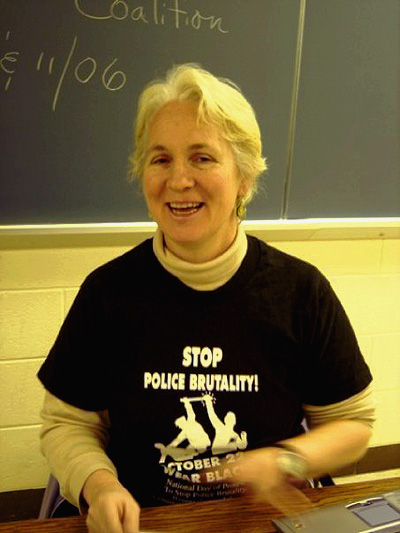Revolution #239, July 17, 2011
In Memoriam
Monica "Kathryn" Shay
Monica Shay, known to many as Kathryn, died on Thursday, July 7. She was 58 years old. Kathryn died after being shot on Saturday, July 2, in her family’s weekend home in Pennsylvania. Also shot were her husband, Paul Shay, Paul’s nephew Joseph Shay, Joseph’s girlfriend Kathryn Erdman, and Kathryn Erdman’s two-year-old son Gregory. Paul’s nephew and the two-year-old child were killed in the shooting. The circumstances that led to this terrible tragedy, and to the police killing of a man said to be the suspect, are not clear at this time.
 PHOTO: October 22 Coalition |
Revolution newspaper joins many others in shock and sadness at this terribly cruel death. Our hopes are for Paul Shay’s and Kathryn Erdman’s full recovery. Our hearts and thoughts go out to those who suffered a loss in this horrific incident, and to all those Kathryn left behind: especially her family, and the many others who knew and worked with her and are so deeply feeling this loss.
Kathryn was a longtime supporter of the movement for revolution in various ways.
Kathryn grew up in Pennsylvania in a Quaker family deeply opposed to the Vietnam war and concerned about those kept at the bottom of society. In the early 1970s, Kathryn traveled to revolutionary China as part of a student group. She lived and worked alongside the people in villages and factories during the mass ferment of the Great Proletarian Cultural Revolution. Kathryn was deeply moved by the earth-shaking transformations she witnessed and the struggle to carry that revolution forward against the forces that would pull society back to capitalist and oppressive relations. She returned to the U.S. inspired and determined to share and spread the real-world possibility of a liberated and revolutionary society.
Kathryn lived for the past 20 years or more in the East Village area of New York City. She was well known and respected for her role in the important resistance to attacks on the homeless and on the radical youth culture that emerged there in the late 1980s. In August 1988, a massive police attack on the homeless encampment in Tompkins Square Park resulted in an international spotlight on the brutality of the police. Kathryn was part of building determined opposition to this, and joined with homeless people and other activists in the mass takeover of a vacant building near Tompkins Square. That powerful and determined mass struggle is widely remembered with great love in the East Village area and beyond.
In recent years, and since its inception, she was actively involved with the October 22nd Coalition to Stop Police Brutality, Repression and the Criminalization of a Generation, and played a role in anchoring that nationwide coalition. She was involved in the Stolen Lives Project in a major way and was well known and close to families of police brutality victims and anti-police-brutality activists across the country.
Nicholas Heyward, father of Nicholas Heyward Jr. who was killed by New York City police, said: “Kathryn was a standup warrior who stood firm in what she knew was right and fought hard against what she knew was wrong. Kathryn has given me courage and inspiration at times when I needed it most.”
Kathryn never stopped fighting injustice, or caring for those most oppressed by this system. Generations of our youth have been locked into a future of constant harassment, criminalization and imprisonment, and every day more parents experience the unbearable pain of losing a child to murdering police. Her untimely and cruel death leaves a hole in the resistance to that oppression. Others who share her hatred of injustice should step up to fill this hole.
Her loss is also deeply felt by colleagues and students at the university where she taught and administered a program devoted to the integration of art and culture with the broader community.
We join with all those who are mourning the loss of Kathryn.
If you like this article, subscribe, donate to and sustain Revolution newspaper.



